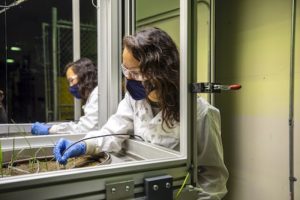 Scientists and engineers from Berkeley Lab teamed up to create the EcoPOD, a unique platform that can be used to study all aspects of self-contained environments with unprecedented precision and control. Essentially a high-tech growing chamber, the EcoPOD is about the size of a Mini Cooper perched on one end, which allows plants to be grown under highly controlled conditions. The inner chamber can house a little over 0.5 cubic yard of soil, has room for about five feet of atmosphere, and is equipped with sensors that measure both above- and below-ground characteristics. Other devices precisely control the environment within the EcoPOD chamber – including water, humidity, temperature, and light intensity and wavelength – to allow simulations of past, present, and future climate scenarios, as well as manipulation of individual environmental parameters.
Scientists and engineers from Berkeley Lab teamed up to create the EcoPOD, a unique platform that can be used to study all aspects of self-contained environments with unprecedented precision and control. Essentially a high-tech growing chamber, the EcoPOD is about the size of a Mini Cooper perched on one end, which allows plants to be grown under highly controlled conditions. The inner chamber can house a little over 0.5 cubic yard of soil, has room for about five feet of atmosphere, and is equipped with sensors that measure both above- and below-ground characteristics. Other devices precisely control the environment within the EcoPOD chamber – including water, humidity, temperature, and light intensity and wavelength – to allow simulations of past, present, and future climate scenarios, as well as manipulation of individual environmental parameters.
“We developed the EcoPOD because there was a recognition that you can’t just do plant biology, you can’t just look at soil, and you can’t just do atmospheric science – they’re all linked,” said project participant Esther Singer, a research scientist in the Environmental Genomics and Systems Biology (EGSB) Division. “The platform allows you to evaluate the impact of many different factors that affect ecosystem processes simultaneously, and provides an opportunity for scientists with diverse expertise to combine their knowledge by working on the same experiment together.”
Many scientists will have the opportunity to use the EcoPOD, including Trent Northen, EGSB Division Deputy for Science. He leads several programs developing and using the smaller-scale EcoFABs, transparent plastic containers that can hold a seedling plant and a small dollop of soil.
Northen plans to introduce organisms isolated from natural environments into the fabricated ecosystems, where researchers can study their activities in real-world conditions and how they change when key genes are altered. “By doing this, we’ll not only be able to better understand our environment, but we’ll also be able to identify metabolites and microbes that can be used for sustainable practices and technologies. For example: microbes that help plants pull carbon out of the atmosphere and restore our soils that have been damaged through poor land management practices,” he said.
The EcoPOD project is funded in part by Berkeley Lab institutional funds, including the LDRD Program, and the Office of Science through the Microbial Community Analysis & Functional Evaluation in Soils (m-CAFEs) Scientific Focus Area.
Read more in the Berkeley Lab News Center.


